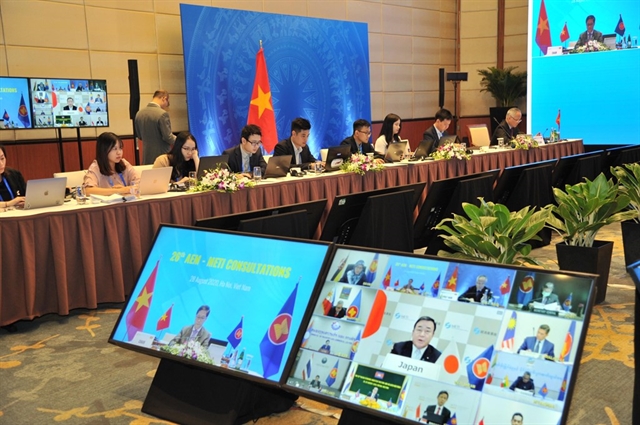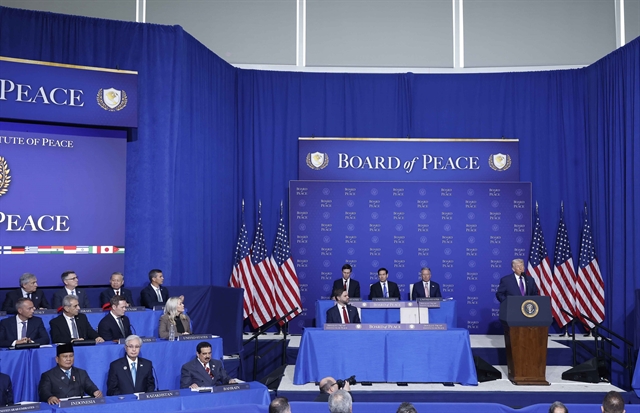 Economy
Economy
.jpg)

|
| The ASEAN Economic Ministers and Japan’s Ministry of Economy, Trade and Industry Consultations which took placed virtually on Friday as part of the 52nd meeting of the ASEAN Economic Ministers meeting— Photo MoIT |
HÀ NỘI — ASEAN and Japan will work together to reduce the negative impacts of the COVID-19 pandemic and to ensure economic and financial sustainability at the macro level through the market opening for trade and investment and development of sustainable supply chains.
The point was highlighted at the ASEAN Economic Ministers (AEM) and Japan’s Ministry of Economy, Trade and Industry (METI) Consultations which took place virtually on Friday as part of the 52nd meeting of the ASEAN Economic Ministers (AEM-52).
Ministers at the event expressed their concerns about the COVID-19 pandemic’s widespread impacts on the lives of people and economies in the region and around the world.
They reaffirmed their commitments to work together to reduce the negative impacts of the pandemic and to ensure macro-economic and financial sustainability through the market opening to trade and investment and develop sustainable supply chains, especially for essential goods such as healthcare products, medicines and food.
Ministers also stressed the importance of the joint effort in promoting regional economic growth and social stability, including the signing of the Regional Comprehensive Economic Partnership this year.
Ministers highly appreciated the progress of the ASEAN-Japan Economic Resilience Action Plan passed on July 29 with three objectives, including sustaining the close economic ties developed by ASEAN and Japan, mitigating the adverse impact of COVID-19 on the economy and strengthening economic resilience in response to the economic challenges brought about by the COVID-19 pandemic.
Japan was the fourth largest trade partner and the second largest investor of ASEAN in 2019, with a two-way trade of US$225.9 billion in 2019, accounting for eight per cent of the total trade of ASEAN. Japan poured $20.4 billion investment in ASEAN, or 12.7 per cent of the total foreign investment in the region last year.
Consultations with Hong Kong, Russia
The cooperation between ASEAN and Hong Kong, China through free trade agreements was an important factor to economic recovery and growth as well as two-way trade, ministers said at the AEM and Hong Kong Consultations also taking place online yesterday.
Agreeing the importance of ultilising the ASEAN-Hong Kong Free Trade Agreement (AHKFTA) and ASEAN-Hong Kong Investment Agreement (AHKIA) in boosting economic growth and bilateral trade, ministers said that the consultations needed to be sped up to bring the two deals into force by the end of this year.
The two FTAs came into force to between Hong Kong and eight ASEAN member countries but the consultations for approval of the trade deals were underway in Brunei and Cambodia.
Trade between ASEAN and Hong Kong reached $111 billion in 2019 or 3.9 per cent of the ASEAN’s total trade, making Hong Kong the seven largest trade partner of ASEAN.
Hong Kong invested around $11.3 billion in ASEAN last year, or 7 per cent of foreign investment into the bloc.
At the consultations with Russia, ministers said that the joint efforts would continue to minimise the impacts of the COVID-19 pandemic on the economy and maintain macro-economic and financial sustainability.
Ministers highly appreciated the achievements in the bilateral cooperation in agriculture, energy, infrastructure, financial services and digital technology, adding that the cooperation would help ASEAN to improve competitiveness and develop technology and the regional infrastructure.
Ministers also stressed the importance of enhancing linkage between ASEAN and the Eurasian Economic Union to effectively exploit the potential of both sides.
The two-way trade between ASEAN and Russia totalled $18.2 trillion in 2019. Russia invested $45 million in ASEAN last year. — VNS
.jpg)



